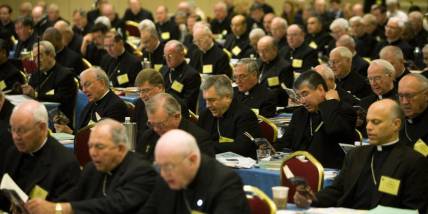U.S. Bishops Appear Poised to Elect LGBTQ-Negative Leaders
The U.S. Conference of Catholic Bishops (USCCB) is set to elect a new secretary, as well as six committee chairs next week, when they meet from November 13th to 16th. Most of the candidates skew LGBTQ-negative, once again contrasting the USCCB with Pope Francis’ desired way of being church.
Election for USCCB Secretary
Most significantly, the bishops will vote for the new USCCB Secretary, who also oversees the Committee on Priorities and Plans. The current secretary, Oklahoma City’s Archbishop Paul Coakley, is a nominated against Portland-in-Oregon’s Archbishop Alexander Sample. Both prelates are quite LGBTQ-negative.
Earlier this year, Coakley compared transgender identities to substance abuse disorder, lamented that homosexuality had been declassified as a mental illness in the 1970s, and seemingly endorsed conversion therapy. Formerly, as chair of the USCCB’s Committee on Domestic Justice and Human Development, he led efforts to oppose the Equality Act and President Biden’s efforts to implement LGBTQ+ non-discrimination protections. During the Trump administration, Coakley applauded the then-president’s rules allowing social service agencies and homeless shelters to discriminate against LGBTQ+ people. In 2014, Coakley said marriage equality “thwarts the common good.” He is also a member of the episcopal advisory board for the right-wing Napa Institute, and said he has the “deepest respect” for conspiracy theorist Archbishop Carlo Maria Viganó.
Sample made headlines this year for abruptly shuttering the Archdiocese of Portland’s Catholic schools office, which many people speculated was due to the backlash Sample received after issuing a transgender-negative policy. In that policy, the archbishop referred to gender-affirming medical care as “totalitarian,” and imposed restrictions on LGBTQ+ students. In a 2022 interview, Sample linked the movement for LGBTQ+ rights to satanic influence. In 2013, shortly after becoming archbishop, he told a Portland-area parish with a long history of LGBTQ+ ministry that it could not participate in Pride celebrations—which the priest and parishioners ignored. In 2014, however, Sample did suggest lesbian and gay people should not be discriminated against, even while the institutional church worked to stop marriage equality.
Committee on Catholic Education
For the bishops’ committee on Catholic schools, Bishop James Conley of Lincoln, Nebraska, an archconservative, faces off against Trenton’s Bishop David O’Connell, who is more moderate. This committee’s work has increased relevance given the increasing disputes in Catholic education over gender and sexuality issues, which has given rise to dozens of anti-LGBTQ+ diocesan policies.
In the past, Conley has worked to stop LGBTQ+ non-discrimination protections in Nebraska, and forced Catholic organizations to withdraw from charitable events which encourage non-discrimination policies. In 2019, as chair of the U.S. bishops’ subcommittee against marriage equality, Conley joined fellow prelates in supporting the Trump administration’s efforts to remove LGBTQ+ protections in healthcare and social services, and he opposed the Equality Act, which he and other bishops described as a “detriment to society as a whole.” In 2017, he signed onto an interfaith letter which denied that transgender identities were real.
O’Connell’s public record on LGBTQ+ issues is limited. As president of The Catholic University of America, he repeatedly denied student requests for an LGBTQ+ campus group. However, as bishop, he has followed a line more consistent with Pope Francis, and he has embraced the Synod on Synodality.
Committee on Doctrine
For the USCCB’s doctrine committee, Marquette’s Bishop John Doerfler vies against Brooklyn auxiliary Bishop James Massa. Of note, in 2021 Doerfler was one of the first U.S. bishops to release a diocesan policy with explicit restrictions on LGBTQ+ Catholics. While Doerfler and Massa’s public records on LGBTQ+ issues are minimal, whichever of them becomes chair of the Committee on Doctrine will tremendously impact revisions to the U.S. bishops’ healthcare directives now underway, and which can potentially ban gender-affirming care in Catholic hospitals.
Ten years after Pope Francis’ election, it seems very little has changed at the U.S. Conference of Catholic Bishops. The conference continually elected leaders who are mostly opposed to the pope’s call for reform and inclusion. The USCCB’s current president, Archbishop Timothy Broglio of the Military Services, U.S.A., is a strident culture warrior who has made harsh remarks against transgender people.
What is notable in the past few years, however, is that it seems that the bishops aligned with Pope Francis are almost absent from even running for leadership posts. Aside from possibly Bishop O’Connell, none of the candidates above are “Francis bishops” in spirit, even if they are appointed by him. Perhaps, like most U.S. Catholics, the “Francis bishops” have just decided their time is best spent elsewhere.
—Robert Shine (he/him), New Ways Ministry, November 10, 2023





Perhaps someday the U.S. Catholic Bishops will get over themselves and truly be shepherds among the People of God!
Amen.
Dear Steven,
I had no words that come close to your sad, but accurate appraisal in my mind.
I was in a Catholic grade school when Pope John XXIII was pope and started Vatican II.
I had never felt that same open spirit it the Vatican until Francis was elected pope.
Like many people I wish he could be Superman, but his role calls on him to be the opposite, the blind beggar caring for those most marginalized.
My prayer for Pope Francis is a long healthy live that will enable him to populate the bishops with more priests the have a heart like his.
The USCCB is lurching further to the right or at least further to the negative? None of this should come as a surprise.